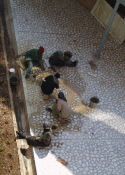



Ethiopia by E-mail
Date: Sat, 02 Oct 2004 09:37:39 -0600
From: "James E. Rollin, Ph.D." <rollin@uic.edu>
Another message from Ethiopia. It is Saturday morning and I have been in my apartment for 5 days. The power is out which seems to be a regular problem, so is the water.
I have been taking a line taxi to work. It is a minibus that follows a specific route. It cost about 1br per ride or about 12 cents US. There is a driver & a conductor. The conductor hangs out the window or side door shouting the destination & collects the fares. If the taxi is not full, it will stop at a busy spot & the driver will get out & hustle up more customers so the taxi is almost always full. The regular taxi's, the contract cabs cost about 30br to go to Sedist Kilo. Friday I took a line taxi to the Arat Kilo & walked up the hill to the university. Arat Kilo means four kilometers, & the university is at Sedist Kilo (six kilometers) & is often called sedist kilo. I don't know where they start measuring from. The whole area was more crowded than I have seen it this week. I asked a student what was going on, & she said it was a celebration of St. Mary on the 21st day of the new year [Ethiopian Calendar]. Not a fasting day or day off work, but many people go to the churches to celebrate.
 At the university I took a picture of five women who have been
cleaning & polishing the new walkways around our building by hand for a couple
weeks with water & a stone of some kind. The walkways are flat stones about 6-8
inches in diameter with some kind of red mortar or cement in between. They are
polishing the stones smooth & making the surface smooth without seams. Usually
there are six women working. They are only part way finished. It is cheaper to
hire 6 women for 3-4 weeks than it is to buy the machine to do this work in a
day or two.
At the university I took a picture of five women who have been
cleaning & polishing the new walkways around our building by hand for a couple
weeks with water & a stone of some kind. The walkways are flat stones about 6-8
inches in diameter with some kind of red mortar or cement in between. They are
polishing the stones smooth & making the surface smooth without seams. Usually
there are six women working. They are only part way finished. It is cheaper to
hire 6 women for 3-4 weeks than it is to buy the machine to do this work in a
day or two.
This is the second time I am typing the following, the power went out at the university while I was working at my desktop.
Mekonin the university driver took me to the IFESH office, he is a good driver & knew where it was when I told him the Nazareth building on Gebre Haile Selassie Rd. There is no systematic system to identify street addresses. On the way over, he told me about the celebration of St. Mary. It is celebrated on the 21st day of each month but is a big celebration on the 21st day of the first & sixth months. It is not a fasting day or a day off work. The 21st of May is traditionally Mary's birthday. Mekonin says that there is a drink called tela [teka] made from maize (corn) & baked bread for the celebration. Mekonin is Ethiopian Orthodox & this celebration is an orthodox celebration.
Mekonin talked about himself & his family on the way back to the university. He has four brothers and one sister. He is the youngest I think. Ten years ago when he was in the 8th grade & his brother was in the 9th grade, his father died. His mother did not work & got a government pension of 51br/month or about $5.90 US. All his brothers and sister contributed to supporting his mother. He & his brother found jobs washing cars with a couple other young men. They were paid tips by the car owners, the owner of the business would not pay them. He made about 20br/day or about $2.30 US/day. He thought this was a good wage. The median income in this country is about $1.00 US/day. He went to extension school in the evening. He said he did not study like he should because he was tired from working all day and he graduated with a 1.8 GPS. 2.0 GPA minimum is the requirement to go on to college. His other siblings went to college. One brother works as a civilian engineer at the air force base in Debre Zeyit. His sister has a degree in auditing/accounting and works at Ethiopian Airlines. He now has a good job with a good salary driving for the university. He & his siblings help support their mother and each other and he says they live well. Mekonin appears to have only one dress shirt, he wears it every day to work. It is always cleaned & pressed. He lives within a 5 minute walk to the university.
Things are going well in class. I taught my first class Monday and the students are eager & enthusiastic. We have been getting very positive comments from them about the way we teach. In the past, university professors have simply lectured at them but our methods are very interactive & require the students to apply what we are talking about to the Ethiopian context.
Jim